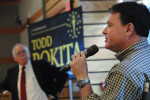Rokita talks D.C. problems, alternatives

For all the complaints among average Americans about the problems in Washington, D.C., a brief conversation with one of the Washington politicians reveals many of the same frustrations.
They don't like the fierce partisanship. They don't like the gridlock. They detest the slow-moving wheels of government.
But what does such talk mean for the constituents? Should they be happy that their representatives feel the same as they do? Or troubled that elected officials so dislike the system of which they are a part?
Rep. Todd Rokita struck a nice balance between the two in a Tuesday afternoon town hall meeting at the DePauw Prindle Institute. The Republican representative expressed some strong opinions against President Barack Obama and other Democrats in Washington.
However, he kept such comments constructive, briefly discussing the problems before moving on to alternatives he and others would like to see enacted.
He displayed this attitude when one citizen asked about the possibility of increasing the gasoline tax in order to fund crumbling infrastructure. Rokita concurred that something certainly has to be done.
"We are the first generation in American history, by any measure, to leave the next generation worse off than the one before," he said, adding that raising taxes is not something he likes to consider.
On the other hand, the state of roads, bridges, locks and other public structures must be addressed, Rokita said, even if the solutions are unpopular.
"The political courage and political will (to lead) have to be there," Rokita said. "If not the gas tax, then something else," he added, noting that stating such an opinion would certainly be used against him in an attack ad.
On the subject of illegal immigration, Rokita also showed a willingness to stray from the black and white party lines of the issue. While he spoke of the importance of border security, he added that up to 40 percent of all illegal immigration has nothing to do with the border.
Instead, it involves foreign nationals, many of them former students, overstaying their visas. The congressman discussed the need for visa reform, which would keep many of these highly-skilled workers in the United States where they can contribute to economic development.
"I would staple a green card to certain diplomas and grow the Hoosier economy that way," Rokita said.
The congressman also fielded a pair of questions he often hears at these town hall meetings: "Are we (the United States) going to go bankrupt? Is the dollar going to survive?"
Even as a graphic of the ever-growing national debt ticked away on the overhead screen behind him, Rokita said all is not lost.
"If we were in a vacuum, I think there would be more concern," Rokita said, adding that no economies in the world are in good shape right now.
"At the world dance, we're the least ugly girl."
The U.S.A. has time to fix its economic woes, Rokita said. The question is how it uses that time.
He pointed out that only 40 percent of the federal budget is actually something Congress controls on a year-to-year basis. The biggest portion of the remaining 60 percent is the combination of Social Security, Medicare
and Medicaid.
While these are fixed costs, leaders need to tackle a different way to fund them in the future.
"We can reform those programs," Rokita said. "All we have to do is show everyone else at the dance that we have a plan to fix what's driving the debt."
Shortly before the end of the program, Rokita was asked about the elephant in any room where political discourse is taking place: the Affordable Care Act. Is he for repealing part of it? Is he for repealing the entire law?
"I'm for repealing all of it. I'm for repealing part of it," Rokita said, remarking that he would sign anything that came on his desk that took power away from the law.
"It's a bad law," he said. "I don't want government controlling my life."
But returning to one of his themes of the day, Rokita said Republicans have to have an alternative in place, saying he was a part of an alternative bill that was drafted in the House of Representatives.
His inclusion on the committee had to do with health savings account initiative passed in Indiana while he served as secretary of state. The success of such plans is a model the country could follow.
As it stands, Rokita said federal law is leading all healthcare down the path the path of the much-maligned VA.
The congressman offered no easy answers, but he did indeed offer answers. The key, Rokita said, lies in the American exceptionalism on which the country was founded and in which he still believes.
"The core of American exceptionalism is the Constitution and the Declaration of Independence," he said. "Never before or since have the best ideas in self-governance come together in one place."
Rokita is doing approximately 20 town hall meetings in August throughout the Fourth Congressional District. Before visiting Greencastle, he was in Kokomo on Monday evening and at Nucor Steel east of Crawfordsville on Tuesday morning.
"Nothing says a congressman has to do these kinds of things," Rokita said. "But this is where you get your marching orders."
Remaining stops on Rokita's agenda include Rensselaer on Wednesday and Monticello and Frankfort on Thursday.
